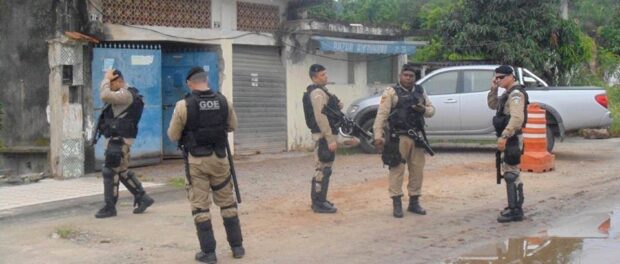
This Wednesday, January 13, Vila Autódromo woke up around 7 o’clock to find a large number of Rio’s Tropa de Choque (Shock Troops), a police unit specifically used for controlling large public manifestations and events of civil unrest, around the neighborhood of a few dozen families. Residents had had no warning police would be there or what was to take place. Lacking information, residents feared a repeat of the attempted demolition last June that resulted in conflict with the Municipal Guard and at least six injured.
Accompanied by the sub-Mayor for Barra da Tijuca, Alex Costa, and his assistant Marli Peçanha, the Shock Troops installed a large white fence across the community’s main road, which now cuts off a large portion of the community’s access to the lagoon. The fence isolates the houses of two families that remain in the portion of Vila Autódromo on the shore, as described in this video with one of the remaining residents. Now, these families will have to get to their houses by walking through the Olympic Park, which is still under construction, requesting permission every time they receive a guest in their homes to enter through the Park. One resident measured the distance these two families now have to walk from the nearest public transportation to their home as five to six kilometers.
Although the police left the area before noon, community members stayed together afterwards to discuss ways to react. One resident spoke about the need to identify the specific laws that protect a person’s right of access to their own home. Residents also suggested city officials know exactly what laws exist, but that they take advantage of residents who do not have the same familiarity with those laws.
In response to the construction of the wall, a group of residents went to the local police to register an incident report. The residents wanted to make sure all aspects of the incident were recorded formally. They believed the early hour of the incident was meant to surprise them, and felt the failure to notify residents before coming and the use of the armed Shock Troops were uncalled for and constituted a crime. At first, the Military Police would not record the incident since they believed there was no crime committed; the Civil Police gave the same response.
When Vila Autódromo residents insisted at least an event report should be registered, the police’s first report was vague and did not include details such as the presence of the Shock Troops or the lack of notice. Even after more details were added and the formal event report was filed, the incident was categorized as a “fato atípico” (atypical case) which means there was no official crime committed.
On the community Facebook page residents wrote: “Impeding access to a part of our community, using the Shock Troops from the Municipal Guard, and closing a public road. Then what is a crime?”


Yesterday morning, Thursday January 14, residents reported further cause for concern. The barricade the community had erected and maintained at the entrance to the community, with 24×7 vigilance by residents since December, was removed by the Municipal Guard overnight. Residents replaced the original barricade with a new one. The original barrier, made of wooden planks, wooden crates, and furniture, was built to prevent large trucks from further ruining the main road through Vila Autódromo on their way to the Olympic Park construction site, and to impede nonconsensual demolitions taking place on properties which had not yet received due compensation. Once again, residents were not given advance warning and they wrote on Facebook: “As always, we don’t know what could happen.” They stated their intention to prevent the Municipal Guard from removing the barricade if they tried again, and asked their allies for help: “Whoever is able to support us, come here, because the situation could become tense!”
This week’s unfolding of events in Vila Autódromo, from the use of Shock Troops traditionally associated with urban land evictions, to the removal of the barricade that provides some element of protection and warning to residents, paints a grim picture for the violence we may see in weeks to come as the City desperately tries to remove the remaining residents of Vila Autódromo.


